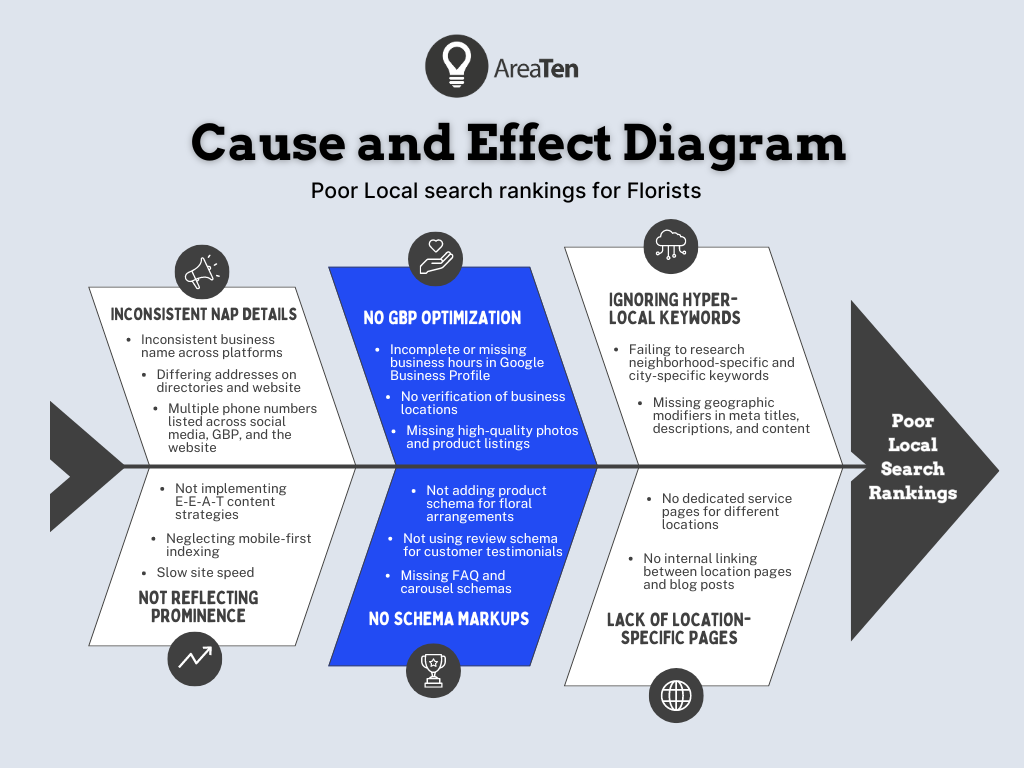Poor search rankings can harm your online presence. They reduce your website traffic and visibility.
Many factors contribute to poor search rankings. Understanding these can help you improve your website’s performance. Search engines use complex algorithms. These determine the order of search results. If your site isn’t optimized, it may rank lower. This means fewer visitors, less engagement, and missed opportunities.
In this blog post, we will explore the common causes of poor search rankings. We will also discuss effective strategies to boost your site’s position. Stay tuned to learn how to make your website more visible and attract more visitors.

Credit: www.positional.com
Table of Contents
ToggleSEO Basics
Understanding SEO Basics is crucial for improving your website’s search rankings. SEO, or Search Engine Optimization, involves optimizing your website to make it more visible to search engines. This visibility is important for driving traffic to your site. Below, we will cover the importance of SEO and how search engines work.
Importance Of SEO
SEO is important for several reasons:
- Increases website visibility
- Drives organic traffic
- Builds credibility and trust
- Improves user experience
- Provides a competitive edge
By following SEO best practices, you can attract more visitors to your site. This can lead to higher engagement and conversions. It also helps build your brand’s authority in your industry.
How Search Engines Work
Search engines like Google use algorithms to rank websites. These algorithms consider many factors to determine the relevance of your site. The main factors include:
| Factor | Impact |
|---|---|
| Keywords | Helps search engines understand your content |
| Backlinks | Indicates the credibility of your site |
| Content Quality | Measures the value of information provided |
| User Experience | Considers site speed and mobile-friendliness |
Search engines crawl and index your website. Crawling involves scanning the content on your pages. Indexing is the process of storing this information. When a user searches for a term, the search engine retrieves and ranks relevant pages. A higher rank leads to better visibility.
To improve your search rankings, focus on creating high-quality content. Use relevant keywords and ensure your site is user-friendly. Regularly update your content to keep it fresh and engaging.
Keyword Research
Keyword research is the cornerstone of effective SEO. It helps identify terms your audience uses. This process can improve your search rankings. Below are key areas to focus on.
Finding Relevant Keywords
Start by identifying words and phrases your target audience uses. Tools like Google Keyword Planner and SEMrush can help. These tools provide data on search volume and competition.
- Brainstorm a list of potential keywords.
- Use tools to find search volume and competition.
- Focus on high volume and low competition keywords.
Consider the intent behind each keyword. Are users looking for information? Are they ready to buy? Use these insights to refine your list.
Using Long-tail Keywords
Long-tail keywords are longer and more specific phrases. They often have lower search volume but higher conversion rates. Users typing these phrases usually know what they want.
- Identify specific phrases related to your niche.
- Use tools to find long-tail keywords with low competition.
- Incorporate these keywords into your content naturally.
For example, instead of “shoes,” use “best running shoes for flat feet.” This helps attract a more targeted audience. It also reduces competition.
| Short-Tail Keyword | Long-Tail Keyword |
|---|---|
| shoes | best running shoes for flat feet |
| SEO | SEO tips for small businesses |
Integrating long-tail keywords into your content can improve your search rankings. It helps attract users who are ready to take action.
On-page Optimization
Improving your search rankings involves many strategies. One key factor is On-Page Optimization. This includes several elements that can help improve your website’s visibility on search engines. Let’s delve into some critical aspects of on-page optimization.
Title Tags And Meta Descriptions
Title tags are essential for search engines and users. A good title tag tells what your page is about. It appears in search engine results and browser tabs. Keep it under 60 characters.
Write clear and concise meta descriptions. These appear below the title tag in search results. They summarize your page content. Aim for 150-160 characters. Include important keywords, but make it readable.
| Element | Best Practices |
|---|---|
| Title Tag | 60 characters max, include keywords |
| Meta Description | 150-160 characters, summarize content |
Header Tags And Content Structure
Header tags help structure your content. They make it easier for readers and search engines to understand.
Organize your content with clear headings. This improves readability. Search engines can also identify key topics. Include keywords naturally in your headings.
Proper content structure keeps readers engaged. It also improves your search rankings.
Quality Content
Quality Content is key to improving search rankings. It attracts visitors, engages readers, and encourages them to stay on your site longer. This, in turn, signals to search engines that your site is valuable and relevant. Let’s explore how creating valuable content and keeping it updated can help boost your search rankings.
Creating Valuable Content
Creating valuable content involves understanding your audience’s needs and delivering information that meets those needs. Focus on providing solutions to problems, answering questions, and offering insights.
Here are some tips to create valuable content:
- Research your audience’s interests and pain points.
- Use clear and simple language to convey your message.
- Provide actionable advice and practical tips.
- Incorporate visuals such as images, infographics, and videos to enhance understanding.
- Ensure your content is well-structured with headings, subheadings, and bullet points for easy readability.
Content Updates
Updating your content is crucial for maintaining its relevance and accuracy. Search engines favor sites that consistently provide fresh and updated information.
Consider the following strategies for content updates:
- Regularly review and update old blog posts with new information.
- Replace outdated statistics and facts with current data.
- Add new sections or expand existing ones to cover new developments in your field.
- Refresh your content with new images and videos.
- Rewrite content to improve clarity, readability, and SEO.
By creating valuable content and keeping it updated, you improve your chances of achieving better search rankings. Your audience will appreciate the effort, and search engines will reward your site with higher visibility.
Technical SEO
Technical SEO plays a crucial role in determining your website’s search rankings. It refers to the optimization of the backend structure of your website. This includes tasks that improve the crawling and indexing of your site. High-quality technical SEO ensures search engines can easily understand and rank your site. Below, we dive into two critical aspects of technical SEO.
Site Speed Optimization
Site speed is a key factor in search rankings. Slow sites frustrate users and increase bounce rates. Search engines notice this and lower your ranking. You can use tools like Google PageSpeed Insights to check your site’s speed.
- Optimize images by compressing them.
- Minimize CSS, JavaScript, and HTML files.
- Use browser caching to store static files.
An optimized site leads to a better user experience. This encourages users to stay longer and engage more. Search engines reward this behavior with higher rankings.
Mobile-friendliness
Mobile-friendliness is another important factor for search rankings. Many users access websites through their smartphones. Search engines prioritize mobile-friendly sites. You can check your site’s mobile-friendliness with Google’s Mobile-Friendly Test.
- Ensure your site uses a responsive design.
- Make sure buttons and links are easy to click on small screens.
- Test your site on various devices and screen sizes.
A mobile-friendly site enhances user experience. It also boosts engagement rates. Both factors are vital for improving search rankings.

Credit: sease.io
Backlink Strategies
Poor search rankings can frustrate you. One effective strategy to improve your rankings is through backlinks. Backlinks are links from other websites that direct users to your site. They play a crucial role in improving your search engine visibility. In this section, we will discuss earning high-quality backlinks and avoiding toxic backlinks.
Earning High-quality Backlinks
High-quality backlinks come from reputable sites. They boost your search rankings. Here are some ways to earn them:
- Guest Blogging: Write articles for popular blogs in your niche. Include a link to your site.
- Content Marketing: Create valuable content. Others will link to it naturally.
- Broken Link Building: Find broken links on other sites. Offer your content as a replacement.
Remember, quality matters more than quantity. A few high-quality backlinks are better than many low-quality ones.
Avoiding Toxic Backlinks
Toxic backlinks come from spammy or low-quality sites. They hurt your search rankings. Here are ways to avoid them:
- Regularly Monitor Backlinks: Use tools like Ahrefs or SEMrush. Identify and disavow toxic links.
- Avoid Link Farms: Do not buy links from link farms. They provide low-quality backlinks.
- Check Site Reputation: Before getting a backlink, check the site’s reputation. Ensure it is reputable.
By avoiding toxic backlinks, you protect your site’s credibility and improve search rankings.
User Experience
A website’s user experience (UX) plays a major role in search rankings. A positive UX leads to longer visits and lower bounce rates. This can improve your site’s position in search results. Let’s explore two key areas of UX improvement.
Improving Site Navigation
Clear and intuitive site navigation helps users find what they need quickly. This keeps visitors engaged and reduces frustration.
- Use a simple menu structure.
- Limit the number of menu items.
- Include a search bar.
- Ensure all links are working.
A well-organized site map can also boost your site’s navigation. This makes it easier for search engines to index your pages.
Reducing Bounce Rate
A high bounce rate indicates visitors leave your site quickly. This negatively impacts your search rankings.
Here are some tips to reduce bounce rate:
- Ensure your site loads quickly.
- Use engaging, relevant content.
- Make your site mobile-friendly.
- Utilize clear and compelling calls-to-action.
By focusing on these areas, you can improve user experience. This can lead to better search rankings and increased traffic.

Credit: www.areaten.com
SEO Tools
When your website suffers from poor search rankings, SEO tools can be a lifesaver. They help analyze your website’s performance, identify flaws, and offer solutions. Let’s dive into some essential SEO tools that can improve your rankings.
Analytics And Tracking
Understanding how users interact with your site is crucial. Analytics and tracking tools provide insights into user behavior, traffic sources, and more. These tools help you understand what works and what doesn’t.
- Google Analytics: Tracks website traffic and user behavior.
- Google Search Console: Monitors search performance and site issues.
- SEMrush: Offers comprehensive data on traffic, backlinks, and keywords.
Using these tools, you can monitor bounce rates, page views, and session durations. This data helps you make informed decisions to enhance your site’s performance.
Keyword Research Tools
Keywords are the backbone of any SEO strategy. Keyword research tools help identify the terms your audience searches for. These tools can improve your content and help you rank higher.
- Ahrefs: Provides keyword ideas, search volume, and difficulty.
- Ubersuggest: Offers keyword suggestions and SEO metrics.
- KWFinder: Helps find long-tail keywords with low SEO difficulty.
By using these tools, you can discover high-performing keywords and integrate them into your content. This practice can make your website more relevant to search queries, boosting your rankings.
Local SEO
Local SEO is crucial for businesses that want to attract customers in their area. It involves optimizing your online presence to increase visibility in local search results. Poor search rankings can significantly impact your local business’s success. Let’s explore some key strategies to improve your local SEO.
Optimizing For Local Searches
To improve your local search rankings, focus on these key areas:
- Keywords: Use local keywords in your website content. For example, “best pizza in New York.”
- Content: Create content relevant to your local audience. This can include blog posts about local events, news, or community activities.
- Meta Tags: Optimize title tags and meta descriptions with local keywords.
- Backlinks: Get backlinks from local websites and directories.
Google My Business
Google My Business (GMB) is a free tool that helps businesses manage their online presence. Ensure your GMB listing is complete and accurate:
| Feature | Action |
|---|---|
| Business Name | Use your real business name. |
| Address | Make sure it is accurate and matches your website. |
| Phone Number | Use a local phone number. |
| Website | Link to your main website. |
| Categories | Choose categories that best describe your business. |
| Photos | Add high-quality photos of your business. |
Encourage customers to leave positive reviews on your GMB listing. Respond to reviews to show you care about customer feedback.
What are the Top Strategies for Improving SEO Performance and Boosting Search Rankings?
When it comes to boosting search rankings, implementing top seo solutions is crucial. Strategies such as optimizing website content, improving site speed, enhancing user experience, and building quality backlinks can greatly improve SEO performance. Additionally, focusing on relevant keywords and creating high-quality, useful content can also help improve search rankings. Moreover, regularly updating and maintaining a strong online presence through social media and other digital marketing efforts can also contribute to boosting your website’s SEO. By staying up to date with the latest algorithm changes and trends in the industry, you can continuously adapt your SEO strategies to ensure long-term success. With the right combination of top SEO solutions and ongoing efforts, you can effectively enhance your website’s visibility and attract more organic traffic.
How Can Mastering SEO Strategy Improve Poor Search Rankings?
Mastering seo strategy for better rankings is essential for improving poor search rankings. By properly optimizing website content, using relevant keywords, and building quality backlinks, a website can climb higher in search engine results, increasing visibility and traffic. A solid SEO strategy is key to boosting online presence.
Frequently Asked Questions
What Causes Poor Search Rankings?
Poor search rankings can be caused by various factors, including low-quality content, weak backlinks, slow website speed, and poor user experience.
How To Improve Search Rankings?
To improve search rankings, focus on creating high-quality content, building strong backlinks, optimizing website speed, and enhancing user experience.
Why Is My Website Not Ranking?
Your website may not be ranking due to poor SEO practices, lack of quality content, or technical issues affecting site performance.
Can Poor Design Affect Search Rankings?
Yes, poor design can negatively impact user experience, leading to higher bounce rates and lower search rankings.
How Can Mastering Keyword Difficulty Improve Search Rankings?
Mastering seo strategy rankings is essential for improving search rankings. Understanding keyword difficulty can help identify less competitive keywords to target, increasing the likelihood of ranking higher in search results. By mastering this skill, businesses can effectively optimize their content and drive more organic traffic to their websites. Mastering SEO strategy also involves conducting thorough keyword research, analyzing competition, and staying updated on search engine algorithms. By mastering SEO strategy, businesses can stay ahead of their competitors and continuously improve their search rankings. Additionally, mastering SEO strategy involves implementing on-page and off-page optimization techniques to increase the visibility and credibility of their websites.
Conclusion
Improving search rankings takes time and effort. Focus on quality content. Optimize your website for better user experience. Use relevant keywords naturally. Monitor your progress regularly. Adjust strategies based on results. Consistency is key. Stay updated with SEO trends. Engage with your audience.
Respond to comments and feedback. Build backlinks from trusted sites. Avoid shortcuts or black-hat techniques. Follow these steps to improve your site’s ranking. With patience and persistence, better rankings are achievable. Keep learning and adapting. Success will follow.








